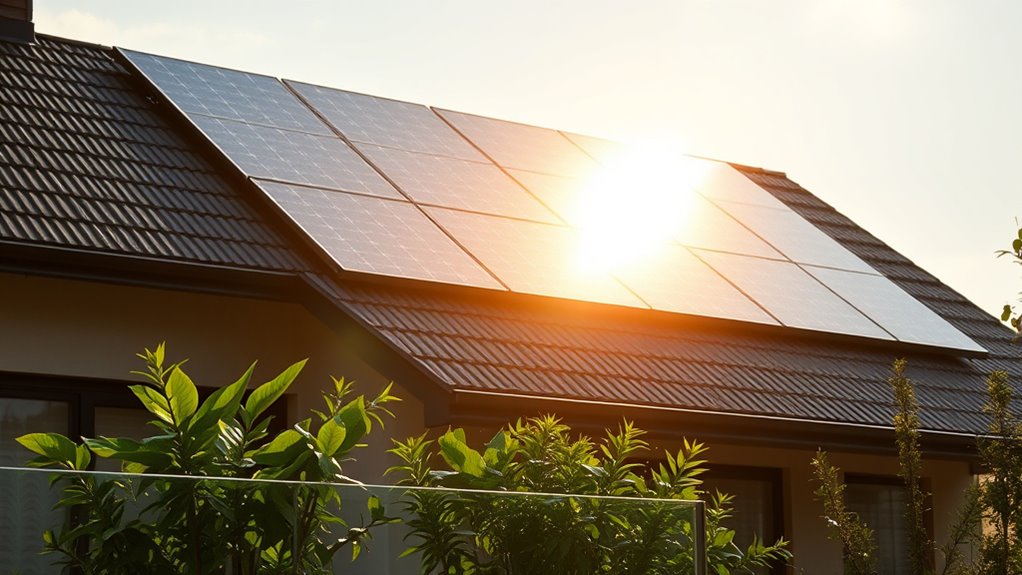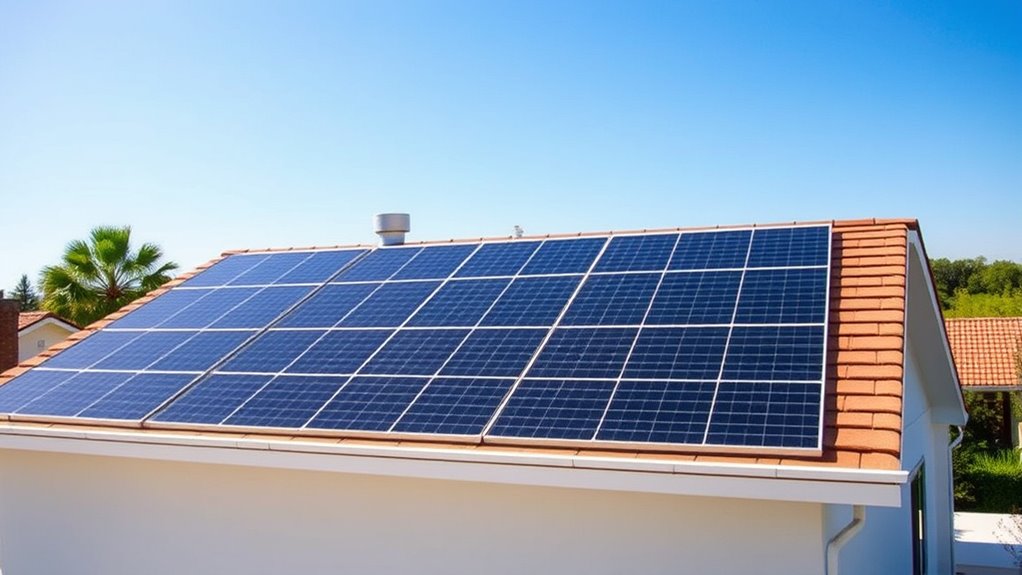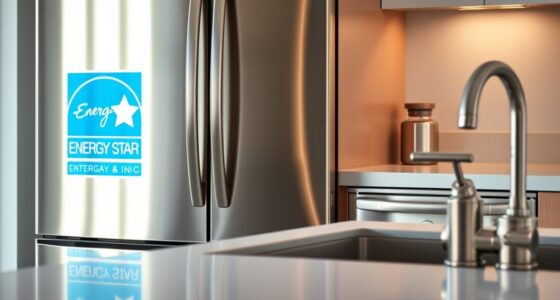Integrating solar panels with your smart home lets you generate, store, and control energy efficiently. You can save excess power in batteries, power your home during cloudy days, and reduce reliance on the grid. Smart systems enable real-time monitoring and automation, optimizing energy use based on weather, time, or household needs. This approach boosts energy independence and sustainability. Keep exploring to discover how these systems can transform your home into a more resilient, eco-friendly space.
Key Takeaways
- Integrate solar panels with smart home systems for real-time energy monitoring and optimized consumption.
- Use automation to prioritize solar energy use and seamlessly switch to battery or grid power as needed.
- Incorporate battery storage to maximize self-sufficiency and manage energy during cloudy days or nighttime.
- Leverage smart controls to adjust energy usage based on weather, household needs, and energy prices.
- Plan system components carefully to enhance grid independence, reduce costs, and improve overall home energy management.

Integrating solar energy into smart homes is transforming the way you generate and manage power. When you install solar panels, you’re not just relying on the grid; you’re actively producing your own clean energy. This shift offers you greater control over your energy consumption, especially when paired with battery storage systems. Battery storage allows you to save excess solar power generated during sunny days, so you have a reliable energy supply even when the sun isn’t shining. This means you can power your home during cloudy days or at night without drawing from the grid, giving you a sense of independence and stability. With efficient battery storage, you’re less vulnerable to fluctuating energy prices and outages, making your home more resilient and self-sufficient.
Achieving grid independence is a significant advantage when you integrate solar with smart home systems. Instead of being solely dependent on the utility company, you can generate, store, and use your own energy, reducing your reliance on the grid. This independence not only lowers your monthly electricity bills but also helps you contribute to a sustainable environment by decreasing your carbon footprint. Many smart home setups allow you to monitor your energy production and consumption in real-time, giving you clear insights into how your solar system is performing. You can optimize your energy usage based on weather conditions, time of day, or household needs, making your energy management more efficient.
Moreover, smart technology enhances your ability to manage your solar setup seamlessly. Automated systems can prioritize solar energy use, switch to battery power when needed, and even draw from the grid only during peak times or when your storage is depleted. This integration ensures you maximize your solar investment while maintaining comfort and convenience. As you plan your solar integration, consider systems that include battery storage and smart controls to fully realize the benefits of grid independence. Understanding the role of projector contrast ratio in image quality can also help you create a comfortable environment for your home entertainment needs.
Frequently Asked Questions
How Do Solar Panels Affect Home Insurance Policies?
You should know that installing solar panels can impact your home insurance policies. They may lead to insurance implications, such as higher premiums or coverage adjustments, because of increased risks like fire or storm damage. It is crucial to inform your insurer about the solar system, so they can update your policy accordingly. This ensures you’re properly covered and avoid surprises if you need to file a claim related to your solar panels.
Can Solar Energy Systems Increase Property Value Significantly?
Yes, solar energy systems can markedly increase your property value. When you install solar panels, you enhance property appreciation because buyers see the investment benefits and lower energy costs. This upgrade makes your home more attractive in the real estate market, often leading to quicker sales and higher offers. Overall, integrating solar energy not only saves you money but also boosts your property’s long-term value and appeal.
What Maintenance Is Required for Solar Panels Over Time?
You need to regularly clean your solar panels to remove dirt, dust, and debris that can reduce efficiency. Performance monitoring helps you track how well your system operates over time, so you can spot potential issues early. Additionally, check for shading or damage, and schedule professional inspections annually to guarantee everything is functioning at its best. Keeping up with these maintenance tasks maximizes your solar panels’ lifespan and energy output.
Are There Government Incentives for Installing Solar Panels?
Yes, you can benefit from government rebates and tax incentives when installing solar panels. These programs aim to reduce your upfront costs and encourage renewable energy use. You should check federal, state, and local programs, as eligibility and benefits vary. By taking advantage of these incentives, you’ll save money and support sustainable energy efforts. Be sure to consult a solar professional to help you navigate available rebates and maximize your savings.
How Does Solar Integration Impact Home Resale Potential?
Jumping the gun can pay off, especially when it comes to solar integration boosting your home’s resale potential. It aligns with current resale market trends and buyer preferences for energy-efficient features. Solar panels make your home more attractive, potentially increasing value and speeding up sales. By going green, you’re not just saving money but also appealing to eco-conscious buyers, giving you a leg up in today’s competitive market.
Conclusion
By integrating solar energy into your smart home, you embrace sustainability and independence. While the technology offers control and cost savings, it also demands careful planning and maintenance. You get to enjoy the freedom of renewable power, yet face the responsibility of managing panels and energy flow. Ultimately, solar integration is a balance—between innovation and effort—where you become both the architect of your energy future and a steward of the environment.








